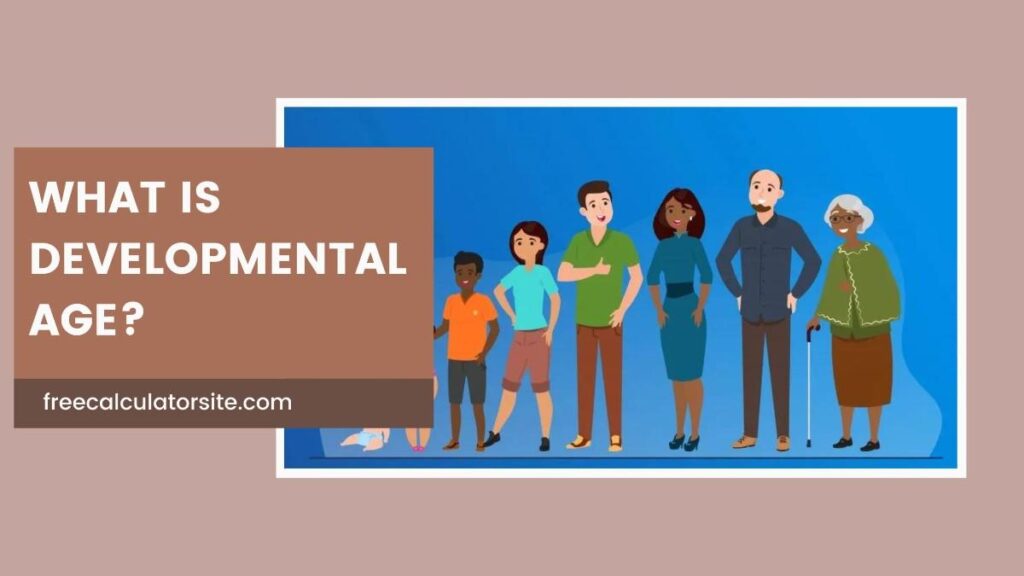
Developmental age refers to the measure of a person’s physical, cognitive, emotional, and social development compared to typical milestones associated with their chronological age.
Unlike chronological age, which is simply the number of years someone has been alive, developmental age gives a deeper insight into how an individual is progressing relative to peers.
This concept is especially useful when assessing children, but it can also apply to adults, particularly in cases where development may be delayed or accelerated due to genetic, environmental, or neurological factors.
Understanding Developmental Age vs. Chronological Age
Chronological age is easy to define. It’s the time passed since the day a person was born, counted in years, months, and days.
Developmental age, on the other hand, can vary from individual to individual, even among children of the same chronological age.
For instance, a child who is four years old chronologically might have a developmental age closer to three in terms of language skills, while another four-year-old may display the social skills of a six-year-old.
This variability is normal and expected to some degree, but significant deviations in developmental age can indicate delays or exceptional abilities that need attention.
Measuring Developmental Age
Developmental age is often measured using standardized assessments and tests that evaluate various aspects of growth.
These assessments focus on key areas such as:
- Cognitive Development: How a child thinks, learns, and problem-solves.
- Physical Development: Motor skills, including both fine (e.g., drawing) and gross (e.g., running) movements.
- Language Development: Speaking, listening, understanding, and forming coherent thoughts.
- Social-Emotional Development: Interaction with peers, emotional regulation, and understanding of social norms.
Pediatricians, child psychologists, and educators often use these benchmarks to compare an individual’s progress against typical developmental milestones for their chronological age.
The Role of Developmental Milestones
Developmental milestones are behaviors or physical skills that most children reach by a certain age.
For example, walking typically begins around 12 months, and forming complete sentences happens between 24 to 36 months.
These milestones are useful guides but not rigid rules.
Some children might reach milestones earlier or later than expected, which doesn’t always indicate an issue with development.
When children miss milestones by a significant margin, developmental age can help professionals pinpoint areas of concern and create appropriate intervention strategies.
For example, a child who has delayed speech might undergo speech therapy to catch up to their peers developmentally.
Factors Influencing Developmental Age
Developmental age can be influenced by various factors, both internal and external.
Some of the most common influences include:
1. Genetics
Children inherit traits from their parents that impact their development.
Some genetic conditions, such as Down syndrome or Fragile X syndrome, can lead to delayed physical and cognitive development.
Conversely, certain genetic gifts can result in accelerated development in areas such as memory, intelligence, or motor skills.
2. Environment
A child’s environment plays a crucial role in shaping their developmental age.
A nurturing, stimulating environment with access to learning materials, opportunities for physical activity, and rich social interactions can promote accelerated development.
On the other hand, children growing up in environments lacking stimulation or those experiencing neglect may have delays in one or more areas of development.
3. Health and Nutrition
Good health and proper nutrition are fundamental for physical and cognitive development.
A child who experiences chronic illness or malnutrition may have a lower developmental age due to delays in physical growth or cognitive functions.
For instance, iron deficiency during early childhood can negatively affect brain development and cognitive abilities.
4. Cultural and Social Contexts
Culture can also shape developmental age by influencing what behaviors are encouraged or expected at certain stages.
For instance, in some cultures, children may be encouraged to become independent at a younger age, which may advance social and emotional development.
Similarly, educational systems and societal norms regarding when children begin formal schooling or are expected to complete certain academic tasks can affect their cognitive and social development.
5. Trauma and Stress
Children who experience trauma, such as abuse, loss, or chronic stress, may have a delayed developmental age.
Stress can impede cognitive development, affect emotional regulation, and even impact physical growth.
Intervention in such cases often requires specialized care, including therapy to help the child overcome the emotional and psychological barriers hindering their development.
Developmental Age in Adults
Though developmental age is most commonly discussed in relation to children, it can also be relevant for adults.
For example, individuals with intellectual disabilities or developmental disorders might have a lower developmental age than their chronological age.
Developmental age in adults may be assessed to ensure they are provided with appropriate support, resources, and living conditions that align with their abilities rather than their chronological age.
In some cases, developmental age can also be used to gauge rehabilitation progress in individuals recovering from brain injuries or neurological conditions.
For example, after a traumatic brain injury, an adult may lose certain skills and abilities.
Developmental age assessments can help determine the level of function the individual is capable of achieving and what interventions are necessary for recovery.
Also Read: What is Biological Age?
Applications of Developmental Age in Education and Healthcare
Developmental age plays a key role in creating individualized educational plans (IEPs) and therapeutic interventions.
In school systems, children who lag behind their peers developmentally may receive special education services designed to help them catch up.
Similarly, children who are developmentally advanced may be provided with enrichment programs that allow them to progress at a faster pace.
In healthcare, understanding developmental age can assist in diagnosing developmental disorders such as autism spectrum disorder (ASD), attention-deficit hyperactivity disorder (ADHD), or speech and language disorders.
By understanding where a child’s developmental age falls relative to their peers, healthcare providers can offer targeted therapies and treatments to support growth.
The Importance of Early Detection
Identifying a child’s developmental age early is crucial for ensuring they receive the support and resources they need to thrive.
Delays in development may be early signs of underlying health or neurological conditions that, if left unaddressed, could lead to further challenges down the road.
Conversely, recognizing advanced developmental age can lead to opportunities for enriched learning experiences that help foster talent and potential.
Parents and caregivers play a vital role in recognizing their child’s developmental progress.
Regular pediatric check-ups, communication with teachers, and observing their child’s behavior are all important steps in understanding whether their developmental age aligns with their chronological age.
Conclusion
Developmental age provides a comprehensive view of an individual’s growth and maturity, encompassing physical, cognitive, and emotional aspects.
It goes beyond the simple number of years a person has been alive, offering deeper insight into their unique progression.
While developmental age is most commonly applied to children, its relevance extends into adulthood in various circumstances.
By understanding developmental age, caregivers, educators, and healthcare professionals can better support individuals in achieving their full potential, regardless of whether they are progressing at a typical pace or facing developmental delays.

Sayantika Karmakar provides expert insights on financial calculators in her blog posts.
